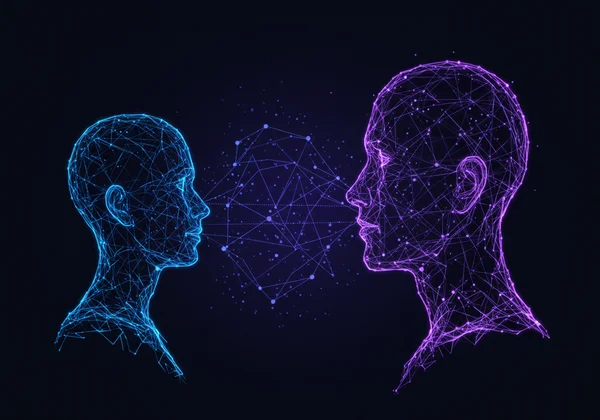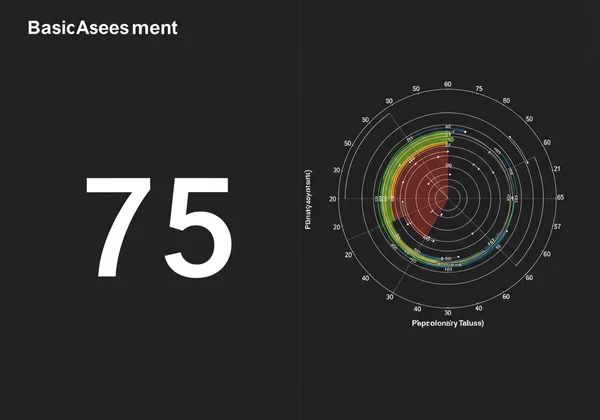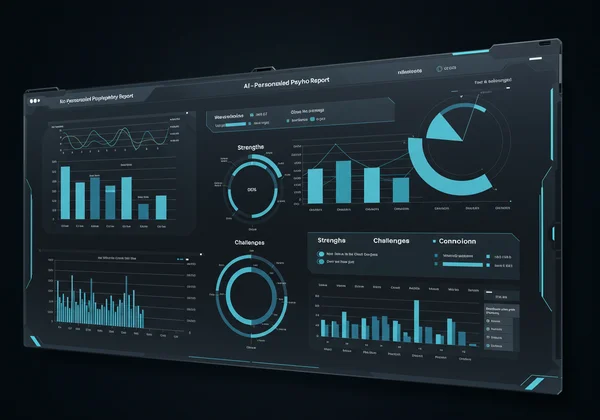Test di Psicopatia: Approfondimenti con l'IA
Hai mai fatto una valutazione della personalità online ed è rimasto solo un numero? Un singolo punteggio che solleva più domande che risposte. Quando si tratta di qualcosa di complesso come lo spettro della psicopatia, un risultato semplice raramente è sufficiente. Potresti chiederti: Come faccio a sapere se sono uno psicopatico? e scoprire che un punteggio di base non fornisce la profondità necessaria per una vera auto-comprensione. È qui che la tecnologia, in particolare l'intelligenza artificiale, trasforma un semplice test di psicopatia in un potente strumento per ottenere approfondimenti.
Sfruttando il machine learning avanzato, il nostro sistema IA eccelle nello scoprire modelli e sfumature in dati complessi che sono spesso invisibili all'occhio nudo. Il Report Personalizzato dall'IA offerto sulla nostra piattaforma è progettato per fare proprio questo. Va oltre un punteggio preliminare per fornire un'analisi ricca e dettagliata del tuo profilo di personalità unico. Se sei pronto ad andare oltre i numeri, puoi iniziare qui.

Perché andare oltre un punteggio base del test di psicopatia?
La maggior parte dei quiz online fornisce una valutazione superficiale. Potrebbero dirti se hai un punteggio alto o basso su una particolare scala, ma non riescono a cogliere la complessa rete di tratti che definiscono una personalità. La psicologia umana, specialmente costrutti come la psicopatia, non è una dicotomia netta. Comprendere i tuoi risultati richiede un approccio più sofisticato.
Un normale test di psicopatia online può essere un ottimo punto di partenza per l'auto-esplorazione. Tuttavia, il suo valore è spesso limitato senza un quadro per un'interpretazione più approfondita. È qui che un'analisi dettagliata diventa essenziale per chiunque cerchi approfondimenti significativi sulla psicopatia.
Le sfumature dei tratti psicopatici e dello spettro
Dal punto di vista dei dati, la psicopatia è meglio intesa come uno spettro di tratti, non una singola categoria. Strumenti clinici come la Hare Psychopathy Checklist-Revised (PCLR) valutano varie sfaccettature, tra cui caratteristiche interpersonali (ad es. loquacità superficiale, grandiosità), affettive (ad es. mancanza di empatia, emozioni superficiali) e comportamentali (ad es. impulsività, irresponsabilità). Un punteggio semplice mescola tutti questi elementi, nascondendo i dettagli critici.
Ad esempio, due individui potrebbero ottenere lo stesso punteggio complessivo in un test dello spettro della psicopatia ma avere profili molto diversi. Uno potrebbe ottenere un punteggio elevato in impulsività e assunzione di rischi ma mantenere una certa capacità di empatia, mentre un altro potrebbe presentare un estremo distacco emotivo ma essere meno impulsivo. Comprendere questi tratti di personalità individuali è la chiave per una genuina auto-consapevolezza.
Limitazioni delle semplici valutazioni della psicopatia
Un punteggio di base non può dirti perché hai risposto in un certo modo o come la tua specifica combinazione di tratti influisce sulla tua vita. Manca di contesto e personalizzazione, offrendo un riassunto standardizzato che trascura le tue circostanze individuali. Questa è la principale limitazione che l'analisi basata sull'IA è progettata per superare.
Senza una ripartizione dettagliata, ti resta solo da indovinare il significato dietro il tuo punteggio. Un punteggio alto significa che hai difficoltà nelle relazioni? O indica potenziali punti di forza in ambienti ad alta pressione? Un semplice numero non può fornire queste risposte, ma un report completo sì. Per vedere come ci si sente uno screening più avanzato, puoi fare il test oggi stesso.

Cosa rivela il tuo Report Personalizzato dall'IA sulla Psicopatia
È qui che entra in gioco la potenza dell'IA. Il nostro motore IA elabora le tue risposte al test attraverso un modello sofisticato ispirato a framework psicometrici consolidati. Non si limita a calcolare un punteggio; esegue un'analisi personalizzata della psicopatia, creando una narrazione che spiega in dettaglio il tuo profilo unico.
Il sistema analizza le relazioni tra le tue risposte per generare approfondimenti che sono più della somma delle loro parti. È progettato per fornire una visione multidimensionale della tua personalità.
Ripartizione dettagliata dei tuoi tratti e modelli comportamentali
Invece di un numero, il report IA fornisce una ripartizione granulare delle dimensioni chiave della psicopatia. Evidenzia quali tratti specifici sono più o meno prominenti nel tuo profilo, come manipolatività, profondità emotiva e impulsività. Questo ti permette di vedere una mappa dettagliata del tuo panorama psicologico.
Il report identifica modelli comportamentali ricorrenti basati sulle tue risposte. Questo aiuta a collegare tratti astratti ad azioni concrete, offrendo un quadro più chiaro di come la tua personalità si manifesta nella tua condotta quotidiana e nei processi decisionali.

Identificazione di potenziali punti di forza e sfide
Una caratteristica chiave del report IA è la sua prospettiva equilibrata. Alcuni tratti associati allo spettro della psicopatia, come la calma sotto pressione o un approccio logico e non emotivo ai problemi, possono essere vantaggiosi in contesti specifici, come la leadership o la risposta alle emergenze. Il report aiuta a identificare questi potenziali punti di forza.
Contemporaneamente, individua potenziali sfide. Potrebbe evidenziare come la mancanza di empatia possa mettere a dura prova le relazioni o come l'impulsività possa portare a decisioni errate a lungo termine. Questa attenzione all'auto-consapevolezza ti consente di sfruttare i tuoi punti di forza mentre gestisci le tue sfide in modo costruttivo.
Impatto nel mondo reale sulla vita quotidiana e sulle relazioni
Forse la caratteristica più preziosa è il collegamento del tuo profilo di tratti al suo impatto nel mondo reale. Il report IA offre scenari e spiegazioni su come la tua personalità potrebbe influenzare la tua carriera, le amicizie, le relazioni sentimentali e la soddisfazione generale della vita. Traduce i dati psicologici in approfondimenti pratici e applicabili.
Per chi cerca di comprendere il comportamento di una persona cara, questa sezione può essere particolarmente illuminante. Esplorando questi approfondimenti, gli utenti possono cogliere meglio le dinamiche in gioco nelle loro relazioni. Puoi esplorare i tuoi tratti e vedere come si collegano alla tua vita.
Come massimizzare gli approfondimenti dalla tua analisi personalizzata
Ricevere il tuo report IA dettagliato è il primo passo. Il passo successivo è sapere come usarlo in modo efficace. Interpretare correttamente i risultati del test di psicopatia è fondamentale per trasformare le informazioni in azioni. Considera il report non come un giudizio finale, ma come una guida personalizzata per l'auto-riflessione e la potenziale crescita.
Azioni concrete e guida all'auto-riflessione
Il tuo report IA è progettato per essere un punto di partenza per l'introspezione. Utilizza i suoi risultati per porti domande critiche. Se il report evidenzia l'impulsività, rifletti sulle decisioni recenti in cui questo tratto ha giocato un ruolo. Se indica una mancanza di empatia, considera interazioni specifiche in cui ciò potrebbe aver causato attriti.
La guida fornita incoraggia a pensare a modelli e fattori scatenanti. Questo processo riflessivo è ciò che trasforma i dati grezzi in vera saggezza e auto-comprensione. L'obiettivo è costruire una consapevolezza più cosciente dei tuoi schemi e risposte intrinseci.
Quando considerare un supporto professionale per la salute mentale
È fondamentale comprendere che questo strumento è solo a scopo educativo e informativo. Non sostituisce una diagnosi clinica da parte di un professionista qualificato della salute mentale. Un report IA può fornire approfondimenti incredibili, ma non può sostituire il giudizio sfumato e la relazione terapeutica offerti da uno psicologo o psichiatra.
Se i tuoi risultati o gli approfondimenti nel tuo report ti causano un disagio significativo o confermano serie preoccupazioni sul tuo comportamento e sulle tue relazioni, è un forte segnale per cercare aiuto professionale. Usa il report come punto di partenza per una conversazione con un terapeuta per esplorare questi argomenti in un ambiente sicuro e di supporto.

Sblocca una maggiore auto-comprensione e naviga la complessità
Un semplice punteggio su un test di psicopatia gratuito può essere intrigante, ma in ultima analisi è incompleto. Per comprendere veramente le complessità della tua personalità, hai bisogno di uno strumento che offra profondità, sfumature e personalizzazione. Il Report Personalizzato dall'IA è progettato per fornire proprio questo, trasformando uno screening di base in un viaggio completo di auto-scoperta.
Sfruttando l'intelligenza artificiale, possiamo andare oltre i numeri statici e sbloccare una visione dinamica e sfaccettata di chi siamo. Sei pronto a scoprire l'intera storia dietro il tuo punteggio? Fai la valutazione iniziale sulla nostra piattaforma e sblocca i tuoi approfondimenti personalizzati basati sull'IA.
Domande frequenti sugli approfondimenti sulla psicopatia
Si può fare il test per la psicopatia?
Sì, è possibile utilizzare strumenti di screening per valutare i tratti psicopatici. Valutazioni online come la nostra servono come strumenti educativi preliminari per identificare le caratteristiche chiave. Tuttavia, per una valutazione clinica formale, è necessario consultare un professionista della salute mentale che potrebbe utilizzare strumenti come il test Hare PCLR.
Come faccio a sapere se sono uno psicopatico?
L'unico modo per ricevere una valutazione clinica è attraverso un professionista qualificato. Tuttavia, puoi iniziare a comprendere i tuoi tratti facendo uno strumento di screening scientificamente ispirato. Un report IA sulla psicopatia può fornire approfondimenti dettagliati sui tuoi modelli comportamentali, risposte emotive e stile interpersonale, offrendo un quadro completo che aiuta a rispondere a questa domanda in modo sfumato e non diagnostico.
Quali sono i segni della psicopatia?
I segni chiave rientrano spesso in diverse categorie: interpersonali (ad es. fascino superficiale, manipolatività), affettive (ad es. mancanza di empatia, senso di colpa o rimorso) e comportamentali (ad es. impulsività, irresponsabilità, comportamento antisociale). Un test di psicopatia completo valuterà queste diverse dimensioni.
Il Report IA sulla Psicopatia è una diagnosi?
No, assolutamente no. Il report IA è uno strumento educativo e informativo progettato per l'auto-esplorazione e l'approfondimento. Non fornisce alcuna diagnosi medica, incluso il Disturbo Antisociale di Personalità o qualsiasi altra condizione clinica. I risultati devono essere utilizzati per la riflessione personale, non come sostituto di consulenza medica o psicologica professionale. Se hai serie preoccupazioni, ti preghiamo di consultare un professionista.